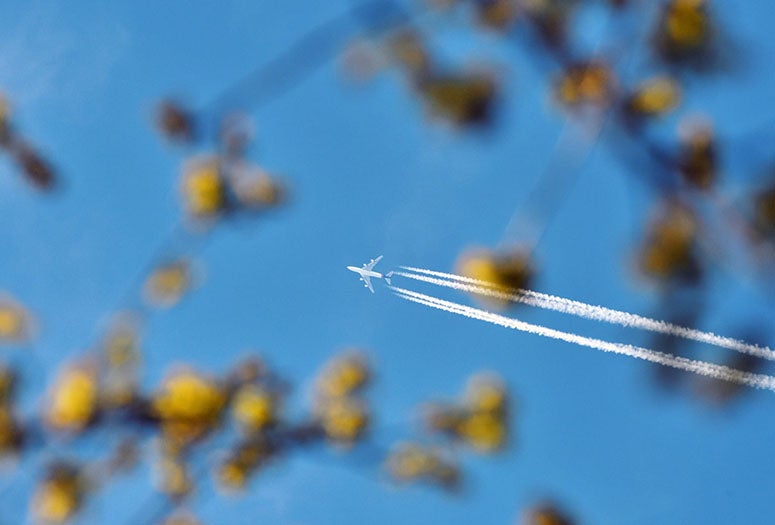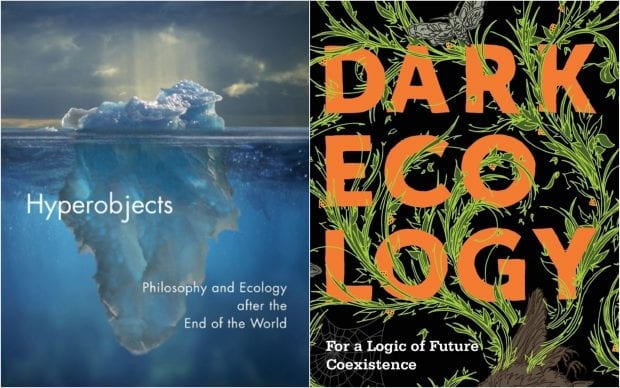Timothy Morton made a public promise on Twitter last month that quickly went viral. His vow: “I won’t be flying to give lectures. Period. It’s the 2020s folks. Time to get extremely real.”
That’s quite a commitment from one of the world’s leading environmental philosophers, a popular lecturer with a rising international profile. Morton’s recent show for BBC Radio 4, “The End of the World Has Already Happened,” had a global reach and resonance. Last month, a widely read New Yorker profile of Morton explored the resounding influence of the Rice professor’s “hyperobject” ontology on our world at large.
Morton, Rice’s Rita Shea Guffey Professor of English, is as keenly aware of that increasing visibility as the detrimental effects of flying — which, mile for mile, deals the most damage to the environment in terms of transportation. A single flight from San Francisco to London, for instance, emits the equivalent of 5.5 tons of carbon dioxide per person. And even though only 3% of the world’s population flies regularly, the airline industry is responsible for 5% of global warming.
“If I’m not setting an example, then what am I doing?” said Morton (who uses the pronouns “they” and “them”). As a lecturer in demand across the world, it was common for Morton to fly weekly to cities across Europe and Asia prior to the pandemic. By their own estimate, Morton spent $20,000 on airfare in 2018 alone.
Morton understands that one person’s carbon emissions are statistically meaningless, just as it’s impossible to allocate blame for our warming planet to individuals: This is a societywide, institutional, industrial, global-scale issue.
“I fully understand that that plane is probably still gonna fly and someone's going to be sitting in that seat right now,” Morton said of their choice to give up flying in this way. “But I think it’s possible to model something different and hopefully to persuade by example that this is something that's doable.”
Doable is a word Morton employs frequently to describe what they feel should be our approach to tackling such global-scale issues: finding the doable things, which require only “slight adjustments” to our lives and convey a message of care. (That phrase will be familiar to anyone steeped in Rice’s own “culture of care.”)
With the advent of Zoom, it is entirely “doable” to give remote lectures in Germany, Slovenia, England and Pennsylvania over the course of a few days — a feat Morton accomplished last week. And as someone who used online meeting software many years prior to the pandemic, Morton believes it’s also possible to establish a rapport and intimacy over the internet.
Morton witnessed it with the Aboriginal activists they interviewed by Zoom last week, in the Buddhist practices they’re learning from a monk in Nepal via Zoom and through the shy students in their courses who enthusiastically responded during class via the Zoom chat box — a welcome space for the introverts of the world.
“Zoom is something you can easily complain about: I mean, my god, it looks like the opening credits of ‘The Muppet Show’ where everybody's waving to each other,” Morton said. “Nevertheless, any medium has pluses and minuses and in any medium, you can make that emotional connection. You just have to get used to it.”
What wasn’t “doable” for Morton anymore was leaving a young son behind while flying to Berlin or London for another conference, enduring the never-ending jet lag, feeling disconnected from the classes taught in Houston or the unshakeable sense that with each flight undertaken for work, Morton was indirectly contributing to the suffering of others.
“I think that's been part of the COVID experience in general,” Morton said. “The decision to do things like using Zoom or giving up flying for work is actually a decision not to want to hurt anybody. There’s this extra layer of communication to it: that ‘I care about you and I don't want you to suffer because of this planet-scale emergency that we've got.’”
It’s a shifting mindset Morton considers crucial as we face down a daunting future. Environmental advocacy doesn’t require “some special sort of religious conversion to totally get rid of who we are or totally change everything,” they said.
“We should frame it in terms of this being practical and a slight adjustment rather than a massive repentance sort of thing, because it’s not about good and evil,” Morton said. “This is about caring and being responsible for others. And those two things are scalable.”
In other words, it’s possible to care about more than one thing at a time: your family, your city, your country, your planet. Taking responsible action to care for these things isn’t a zero-sum game.
“Why not think of it in terms of enhancing your pleasure?” Morton said. “It gives me pleasure to know that you're not suffering from my carbon emissions right now. It gives me pleasure that we're allowing each other not to suffer with a virus and we're allowing each other not to burn to death or die of drought.”
Morton said that, as a philosopher and environmental activist, it can be easy to act like a human cudgel, making others feel “stupid and evil.” Stupid, they said, for understanding neither the extent to which climate change is affecting our planet nor the statistics that show how and why. And evil for not doing the “right” thing.
”Stupid and evil was never a good place from which to launch any practical solutions to anything,” Morton said. “I want to make people feel smart and kind. We know how to do this; it’s a little stretch, not a big one.”
It’s advice that’s of a piece with Morton’s exhortations on their popular BBC show: that despair, depression and guilt aren’t helping us — or the planet. What will save us is reckoning with our past and present while taking up the mantle of care and responsibility for our future.
For Morton, giving up flying to accomplish things that can easily be done over Zoom — doable, a slight adjustment — means that they can be in their living room with their son helping with homework at one moment, in their dining room delivering a lecture the next moment, and then back to preparing noodles for lunch while watching “King of the Hill.” It means being present for their students, especially those first-year Owls who will be taking the 100-level English courses Morton will be teaching in the spring.
It’s not perfect — Morton noted their “funny, cheapo Japanese screen” and occasionally “hastily, badly arranged camera” — but it cultivates a message of care for Morton’s family, for Morton’s students and for their own self as much as for the world.
“I want to reassure people it’s OK to be imperfect, and I think that’s a better place to be coming from,” Morton said. “A lot of people in my line of work tend to talk in terms of sacrifice and denial; that pleasure is evil, consumerism is evil. I think it's better to think in terms of wanting to have more pleasure in the world: If you like polar bears, you might want to live with a view to helping them — and that's nice for you because you get to feel good about the polar bears.”



